Faculty of Systems Engineering Department of Systems Engineering
Never before
Convenience.
Faculty of Systems Engineering Department of Systems Engineering
Never before
Convenience.










Going beyond the traditional boundaries of engineering, students will learn systems engineering, which incorporates information systems such as programming, AI, and control as fundamental subjects and combines them with various types of hardware engineering, in seven courses that allow students to pursue specialization.
Engineers who have acquired both software and hardware technologies are expected to play an active role in the real world in the future.
01
Software and hardware combined
Study "Systems Engineering".
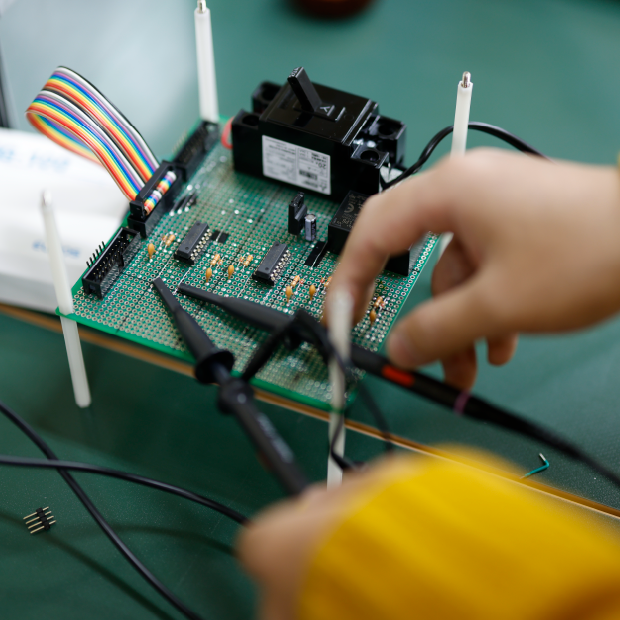
Cars, trains, airplanes, rockets, and other things that were once considered "hardware" now cannot function without "software" created through programming, etc. Regardless of the course, students will learn the basics of hardware while specializing in this "information technology," which is essential for both those studying cars and those studying rockets.
02
Acquire basic expertise ×
It is also possible to learn in a variety of ways that transcend boundaries.
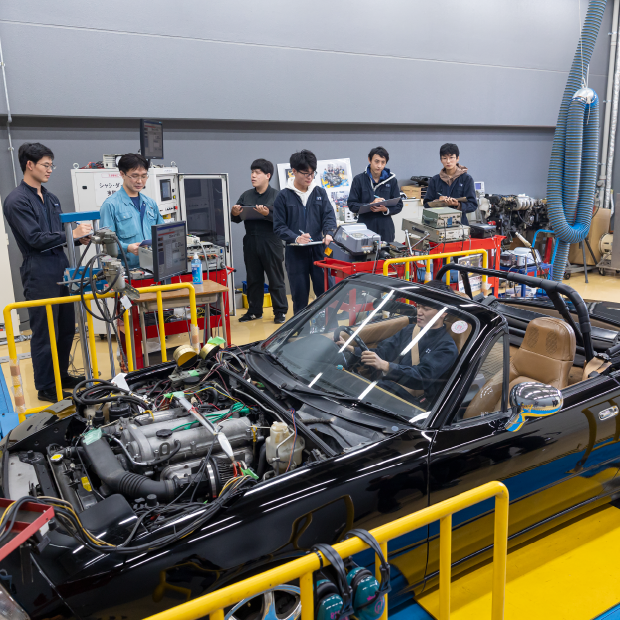
We are now in an age where "flying cars" are actually being put to practical use. We need collaboration that transcends the boundaries of technology. We have seven courses that allow you to learn specialized knowledge and skills outside of your own course, depending on your goals. For the same reason, we welcome students from liberal arts backgrounds. Combining different fields creates something new. We provide thorough support from the basics onwards.
03
Engineering-specific reading comprehension and
Develop written expression skills.
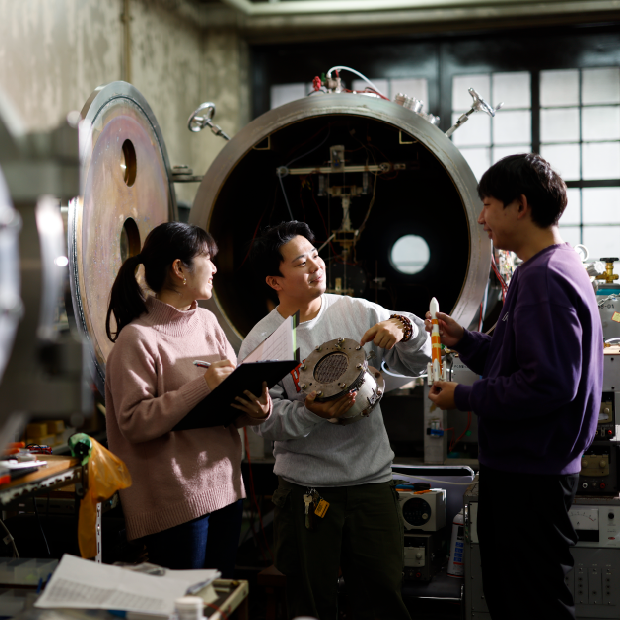
Even after entering society, students will continue to collaborate with colleagues in different fields. In order to connect their technology to real social value, students will hone their communication skills and logical thinking abilities as engineers. Students will also learn reading comprehension to gain new knowledge and writing skills to output. These skills will be further improved through numerous practical training and graduation theses.
We aim to develop systems engineering that combines software (cyberspace) based on information technology such as AI with hardware (physical space) based on mechanical engineering, transportation mechanical engineering, electrical and electronic engineering, and information engineering.
Taking advantage of the know-how cultivated in traditional Faculty of Engineering, including industrial machinery, aerospace, welfare, bio-machinery, automobiles, railways and other mobile machinery, semiconductors, electrical equipment, and information devices, the school offers core subjects in information technology, including programming, AI, and control, which were previously taught in individual departments.
We aim to develop talented people who understand how cyber technology (software) is used, functions, and controlled in physical space (hardware), and how it operates, and who can continue to contribute to a society that continues to evolve in the future.
The Department of Faculty of Systems Engineering places emphasis on specialization, and students are divided into seven courses starting from their first year.

Mechanical Systems Course
By learning about how machines work and engaging in cutting-edge research into rockets, engines, drones, and other fields, students will develop the ability to create new "mechanisms."

Mechanical Design Course
In order to realize cutting-edge machine mechanisms, students learn cutting-edge manufacturing techniques using computer-aided design techniques, machining, and numerical control.
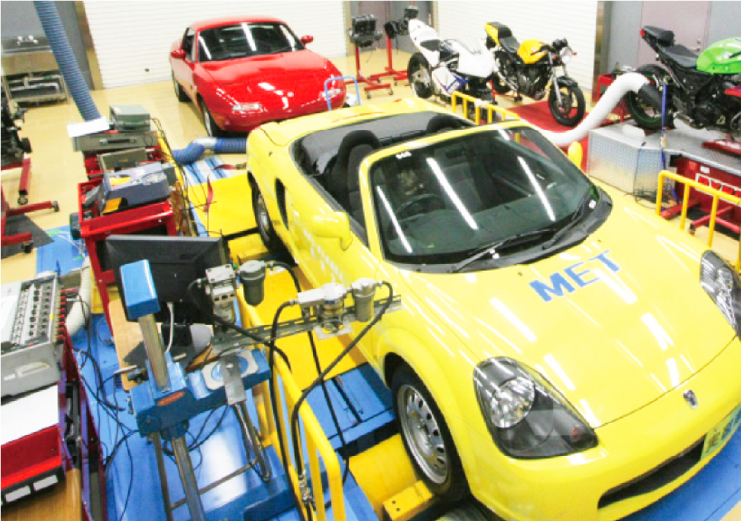
Automotive engineering course
The subject of study is specialized in automobiles. Upon graduation, students will be eligible to take the national exam for a second-class automobile mechanic. The pass rate for the national exam is almost 100% every year!
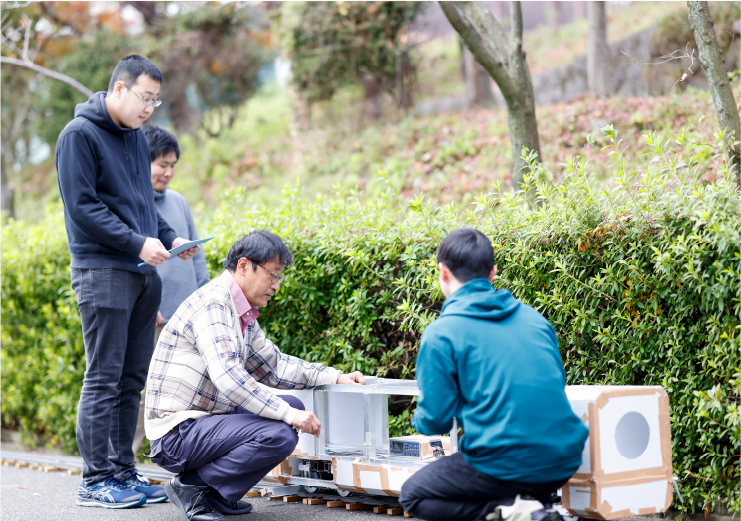
Railway engineering course
The only course in Japan where you can learn about railway vehicle design. Learn the basics of railways and practice in field work. The goal is to work in railway operation and management, vehicle design and manufacturing!

Transportation Systems Course
A course to learn a wide range of vehicles. Aim to become an engineer who can contribute to safety and environmental conservation by learning welfare equipment, environmental engineering, design theory, etc.!
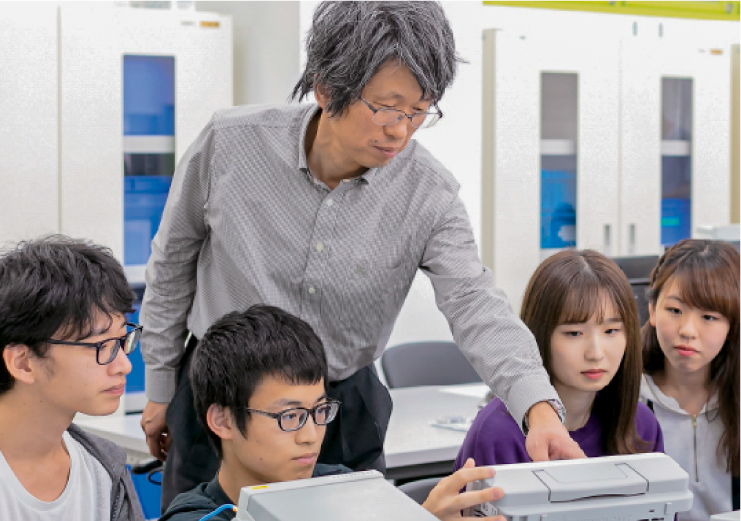
Electrical and electronic engineering course
Students will also learn about hardware based on electromagnetism and electrical circuits, and will gain an understanding of semiconductors, electronic devices, optoelectronics, and energy.
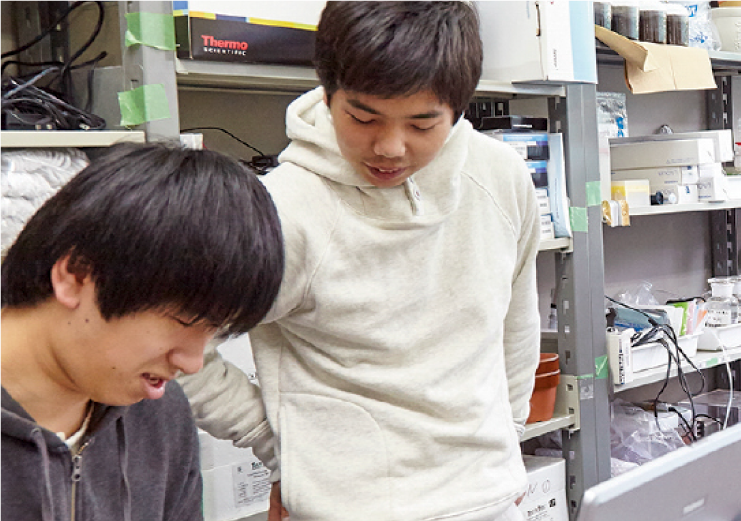
Information and Electronic Engineering Course
In addition to the theory of information and communications, students will study both hardware such as digital circuits and software such as programming to gain a deeper understanding of information and communications networks.

Mr. Kiyohiro Yano
Learning what I want to do in the field of electricity that I love
Now that I've found my path in the future, I'm excited!
He has studied four fields: electrical engineering, electronics engineering, information engineering, and communication engineering. When he first enrolled, he was a Department of Mechanical Engineering student, but he took the transfer exam to join Professor Iwata's laboratory in the Department of Department of Electronics,Information and Communication Engineering.
Now a fourth-year student, I am studying in my chosen laboratory, where I am in-depth research on the electrification of aircraft.
I feel so fulfilled to have found the subject I want to study that I am considering transferring schools.
I would like to utilize my knowledge and skills in power electronics, the power conversion technology required to run home appliances and motors.
That's what I wanted, so I was really happy when I was offered a job at a company that handles railway equipment construction. I will work hard at the various training sessions after joining the company, and I want to be at the forefront as an engineer who supports railway safety.
In junior high school, I made a motor car in class. I never forgot how much fun it was, so I looked for a university department related to electricity. I was attracted to Osaka Sangyo University because I could learn about a wide range of electrical engineering subjects, and the fact that it was convenient to commute to school was also a deciding factor.

Ryota Mibu
I decided to go to university because I wanted to learn more about railways.
Now I'm enjoying learning about a wide range of transportation machinery!
I am studying the mechanisms of machinery and other aspects of railways and automobiles in a comprehensive manner. Since specialized railway subjects begin in my third year, I am looking forward to taking the "Railway Engineering Fieldwork" course, which also includes a tour of a railway vehicle factory. Outside of class, I am active as the head of the Railway Research Club. My days are full of activities, planning events with my peers and holding meetings with organizers outside the university.
In the future, I would like to gain experience in manufacturing and maintaining railway vehicles and contribute to maintaining safe railway operations. Since I used the local railway every day during my high school years, I would like to gain knowledge and skills that will allow me to give back, even if only a little. The number of members in the Railway Research Club has increased, so I would like to try new events that we have never done before.
I came across Osaka Sangyo University while searching for a university where I could specialize in railways. It has the only "Railway Engineering Course" in Japan, a long history and track record that began as a railway school, and the impression I got from the open campus made me think "this is the place for me!" and decided to go to school.
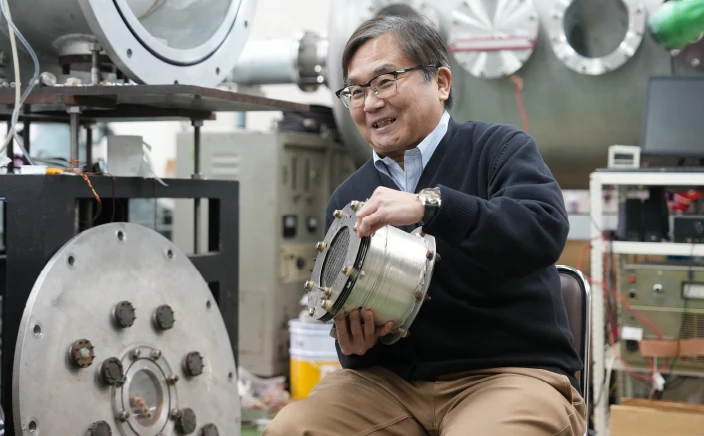
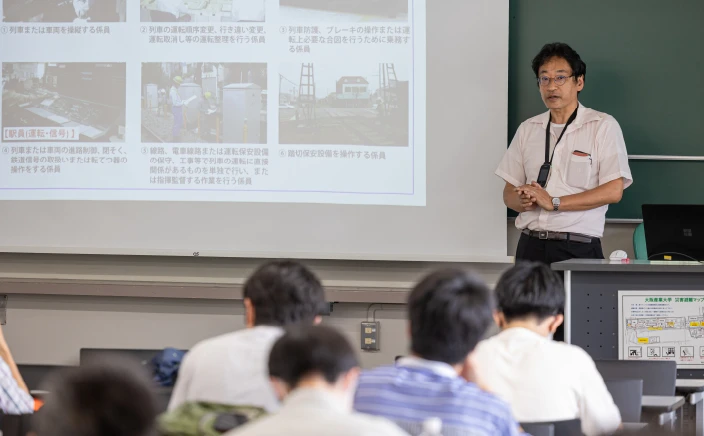

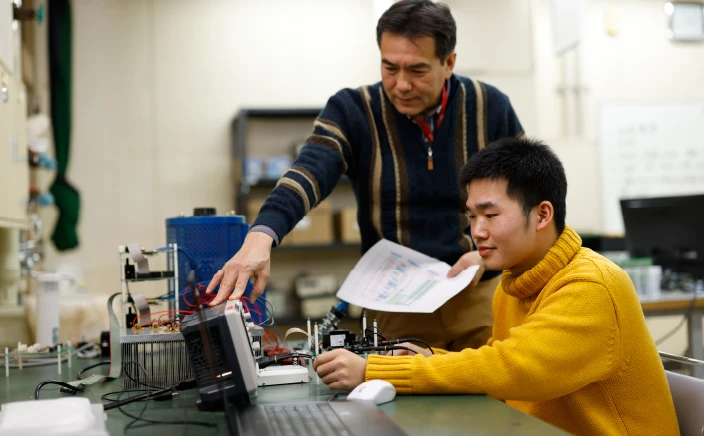
Private enterprises
ITEC Corporation/ Anabuki Construction Co., Ltd./ Arai Gumi/ Ichijo Construction Co., Ltd./ NTT Facilities Kansai Co., Ltd./ Obayashi Road Co., Ltd./ Kashima Road Co., Ltd./ Karimoku Furniture Co., Ltd./ Kansai Electric Power Co., Inc./ Kanden Engineering Co., Ltd./ Kintetsu Zoen Civil Engineering Co., Ltd./ Kinden Co., Ltd./ Kumagai Gumi Co., Ltd./ Clearwater Osaka Co., Ltd./ Keihan Electric Railroad Co., Ltd./ Koizumi Lighting Co., Ltd./ Konoike Gumi Co., Ltd./ JR West Japan General Building Services Co., Ltd./ Shimizu Corporation/ Showa Concrete Industry Co., Ltd./ SUEP./ Space Co., Ltd./ Sekisui House Ltd./ Sekisui House Real Estate Kansai Co., Ltd./ Semba Co., Ltd./ Daiei Kankyo Co., Ltd./ Daiwa House Industry Co., Ltd./ Takamatsu Construction Co., Ltd./ Takenaka Civil Engineering Co., Ltd./ Tama Home Co., Ltd./ Chuo Consultants Co., Ltd./ Tokyu Construction Co., Ltd./ Toshiba Plant Systems & Services Corp./ Tobishima Construction Co., Ltd./ West Nippon Expressway Co., Ltd./ West Japan Railway Company/ Nishihara Hygienic Industry Co., Ltd./ Nishimatsu Construction Co., Ltd. / Japan PS Co., Ltd. / NEXCO Maintenance Kansai Co., Ltd. / Panasonic Environmental Engineering Co., Ltd. / Hanshin Engei Co., Ltd. / Hanshin Construction Co., Ltd. / Hanshin Expressway Technology Co., Ltd. / Fukada Salvage Construction Co., Ltd. / Fudo Tetra Co., Ltd. / Funai Research Institute Co., Ltd. / Maeda Construction Co., Ltd. / Misawa Homes Co., Ltd. / Mitsui Home Co., Ltd. / Yamada SxL Co., Ltd. / Universal Engei Co., Ltd. / Wright Kogyo Co., Ltd. and others
public sector
Ministry of Land, Infrastructure, Transport and Tourism Kinki Regional Development Bureau / Ministry of Defense Maritime Self-Defense Force / Osaka Prefectural Office / Kyoto Prefectural Office / Nara Prefectural Office / Hyogo Prefectural Office / Amagasaki City Hall / Kizu City Hall / Koka City Hall / Nishinomiya City Hall / Higashiosaka City Hall / Amagasaki Municipal Amagasaki Sousei High School / Tokyo Metropolitan Government Junior and Senior High School Science Teachers / Nara Prefectural Nara Suzaku High School, etc.
Osaka Sangyo University Graduate School
Osaka Municipal University Osaka Sangyo University Graduate School / Osaka Sangyo University Osaka Sangyo University Graduate School / Osaka Osaka Sangyo University Graduate School / Osaka Prefecture Osaka Sangyo University Graduate School School / Kyoto Institute of Technology Osaka Sangyo University Graduate School / Kobe Osaka Sangyo University Graduate School / University of Hyogo Osaka Sangyo University Graduate School, etc.

National qualification
Qualifications that can be obtained at the same time as graduation
*1 You must earn the required subject credits in the teacher training course.
*2 [Applicable to Electrical and Electronic Engineering course and Information and Electronic Engineering course] Certification requirements and completion of designated subject credits are required.
Qualifications that allow you to take the exam at the same time as graduation
*3 [Applicable to Automotive Engineering Course] Only Automotive Engineering Course students will be exempt from the practical exam after acquiring the required subject credits and completing the maintenance technology training course.
*4 Some exam subjects may be exempted if you earn the required course credits.
*5 [Applicable to Electrical and Electronic Engineering Course and Information and Electronic Engineering Course] Even if you are currently enrolled, you may be exempt from some of the exam subjects if you earn the required course credits.
Educational and research objectives
The Department of Faculty of Systems Engineering aims to develop systems engineering that connects and fuses software based on information technology such as AI (cyberspace) with hardware based on mechanical engineering, transportation mechanical engineering, electrical and electronic engineering, or information engineering (physical space).
While taking advantage of the strengths in the physical space that have been cultivated in the Faculty of Faculty of Engineering, such as general industrial machinery, aerospace, welfare, bio-machinery, automobiles, railways and other mobile machinery, semiconductors, electrical equipment, and information devices, information technologies such as programming, AI, and control, which have been studied separately in each department until now, are placed as core subjects. In this way, students can understand how these cyber technologies (software) are used, function, and control in the physical space (hardware), and how they work. In this way, the aim is to develop human resources who can understand physical equipment (hardware) controlled by cyber technologies (software) and contribute to real-world industry.
Educational goals and three policies